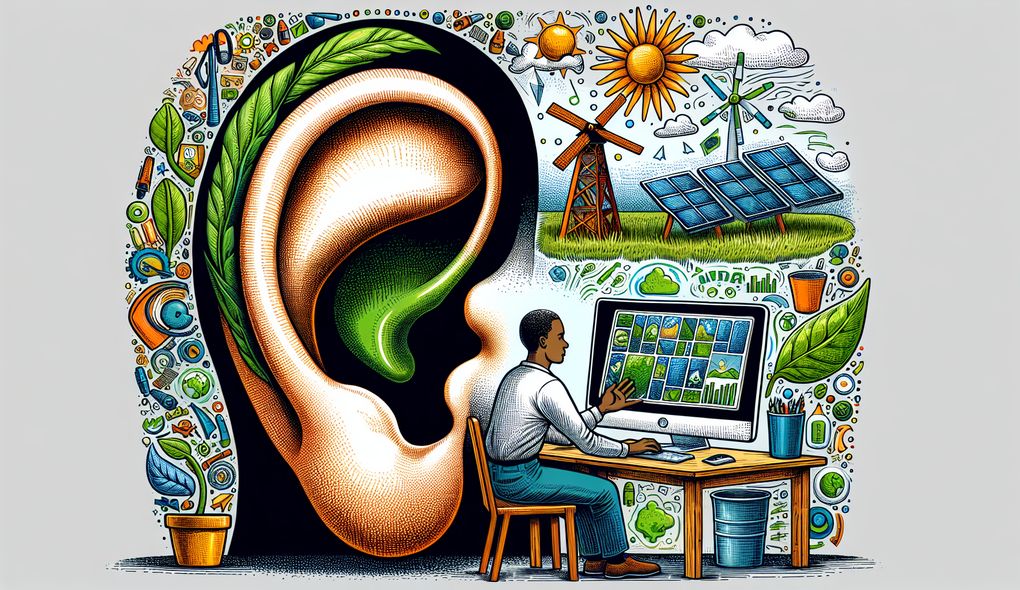How do you adapt your communication style when engaging with different stakeholders?
INTERMEDIATE LEVEL

Sample answer to the question:
When engaging with different stakeholders, I adapt my communication style by first understanding their background, needs, and expectations. For technical stakeholders, such as engineers or scientists, I use clear and concise language to convey complex sustainability concepts. With non-technical stakeholders, such as community members or customers, I focus on using relatable examples and storytelling to make sustainability topics more accessible. Additionally, I adjust the level of detail and technicality in my communication to match the stakeholder's expertise. Overall, my goal is to effectively communicate our sustainability initiatives and achievements to diverse audiences.
Here is a more solid answer:
When engaging with different stakeholders, I first invest time in understanding their background, needs, and expectations. For technical stakeholders, such as engineers or scientists, I tailor my communication by using clear and concise language to effectively convey complex sustainability concepts. I provide specific examples and visual aids to enhance understanding. On the other hand, when communicating with non-technical stakeholders, such as community members or customers, I focus on using relatable examples and storytelling to make sustainability topics more accessible and engaging. I have experience crafting compelling narratives around environmental impact and presenting them in a way that resonates with diverse audiences. I also adapt the level of detail and technicality in my communication to match the stakeholder's expertise, ensuring that the information is neither overwhelming nor oversimplified. By adapting my communication style to different stakeholders, I can effectively convey our sustainability initiatives and achievements while fostering meaningful engagement.
Why is this a more solid answer?
The solid answer expands on the basic answer by providing specific examples and experiences to demonstrate the candidate's skills in adapting language, using relatable examples, and matching the communication level. It also mentions the importance of understanding stakeholder needs and highlights the candidate's experience in crafting compelling narratives and presentations. However, it could be further improved by providing more details on how the candidate has successfully engaged with different stakeholders in previous roles.
An example of a exceptional answer:
When engaging with different stakeholders, I take a comprehensive approach to adapt my communication style. Firstly, I thoroughly research and understand the background, needs, and expectations of each stakeholder group. For technical stakeholders, I have successfully utilized my strong understanding of sustainability concepts to communicate complex ideas in a clear and concise manner. By breaking down technical jargon and using visual aids such as infographics or data visualizations, I ensure that the information is easily digestible and actionable. Furthermore, I have leveraged my creativity and storytelling skills to captivate non-technical stakeholders. Through relatable examples and case studies, I make sustainability topics more relatable and inspire action. Additionally, I adapt the level of detail and technicality in my communication to match the stakeholder's expertise, striking the balance between providing sufficient information and avoiding overwhelming them. For example, when presenting to senior executives, I focus on the high-level impact and potential business benefits, while for grassroots organizations, I emphasize the tangible community benefits. Overall, my adaptable communication style has enabled me to effectively engage with diverse stakeholders and drive positive change.
Why is this an exceptional answer?
The exceptional answer goes into great detail about how the candidate adapts their communication style, providing specific examples and demonstrating a comprehensive understanding of stakeholder engagement. It showcases the candidate's ability to effectively communicate with both technical and non-technical stakeholders, using clear and concise language, visual aids, and relatable examples. The answer also highlights the candidate's expertise in adjusting the level of detail and technicality in their communication to match the stakeholder's expertise. It could be further improved by providing concrete examples of successful stakeholder engagement in previous roles.
How to prepare for this question:
- Research the stakeholders: Before engaging with different stakeholders, thoroughly research their background, needs, and expectations. This will enable you to tailor your communication style effectively.
- Understand the audience: Adapt your language and level of technicality based on the stakeholder's expertise. Use clear and concise language for technical stakeholders and relatable examples for non-technical stakeholders.
- Develop storytelling skills: Enhance your ability to use storytelling to make sustainability topics more accessible and engaging. Practice crafting compelling narratives and case studies that resonate with diverse audiences.
- Stay updated on sustainability trends: Continuously educate yourself on sustainability concepts, industry trends, and regulations. This will help you communicate effectively and establish credibility with stakeholders.
What are interviewers evaluating with this question?
- Understanding stakeholder needs
- Adapting language for technical and non-technical stakeholders
- Using relatable examples and storytelling
- Matching communication level to stakeholder's expertise

